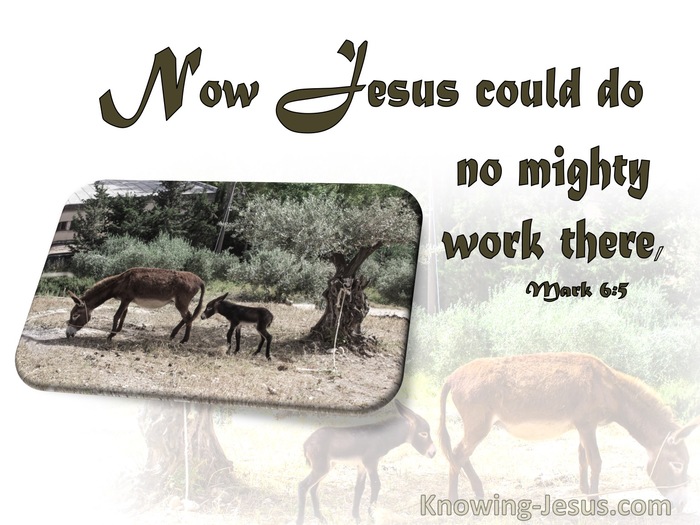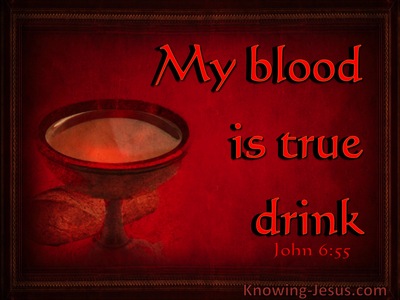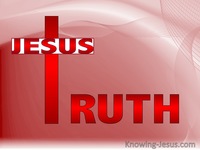◄ What Does Mark 6:5 Mean? ►
And He could do no miracle there except that He laid His hands on a few sick people and healed them.
Mark 6:5(NASB)
Verse of the Day
Rejection is never a pleasant experience, but in Mark 6 we read that it was Jesus Who had to face being rejected, rebuffed, and ridiculed, by the people in his hometown of Nazareth. Although Jesus was born in Bethlehem, He was brought up in the little village of Nazareth, where he worked with his father, Joseph, as a carpenter. However, at about the age of 30, He relocated to Capernaum by the Sea of Galilee, and became an itinerant Rabbi.
Jesus had already become well known, with a large number of followers including His 12 disciples. About a year into his ministry, Jesus decided to return to Nazareth. He had come as the Light of the world and Lord of life, and I am sure He was keen to share the truth of the gospel with the friends and neighbours He had known since childhood.
As was the custom with visiting Rabbis, Jesus was invited to preach at the Synagogue on the Sabbath. However, He came to His own people in His hometown and they refused to accept Him or pay heed to His message. They were already aware of His fame and had heard about the mighty miracles He performed. But the people in Nazareth had hardened their hearts against the Lord, in unbelief. Their eyes were blind and their ears were closed to the truth.
It is said that 'familiarity breeds contempt', and the villagers in Nazareth refused to look past their own close-minded biases, hostility, and jealousy. And although they acknowledged that Jesus spoke words of wisdom with great authority, they would not believe that He had come from God and could not accept that He was endowed with wisdom from on high. Truth is hated because it exposes lies and deceit, and so they rejected incarnate truth.
The contempt the townsfolk had for Jesus was partly due to their refusal to accept the virgin-birth. Instead of referring to Jesus as 'the son of Joseph', as was the custom, they disdainfully labelled Him as the illegitimate 'son of Mary'. It was because of their proud unbelief and lack of faith that Mark writes: "And He could do no miracle in Nazareth, except that He laid His hands on a few sick people and healed them."
Jesus was their Messiah, but they did not receive Him. It was Jesus whom Malachi called: "The Sun of righteousness Who will come with healing in his wings," and Zechariah rejoiced that the Messiah had come to visit His people, and prophesied of their coming redemption and deliverance from their enemies. Jesus knew what bigoted, close-minded people they were, and said to them: "A prophet is not without honour, except in his own country, and among his own kin, and in his own house." And so we read: "Jesus was unable to do any work of power there, but only to put his hands on one or two persons who were ill, and make them well."
Mark made it clear that Jesus performed miracles as an acknowledgment of someone's faith: "Your faith has made you whole," was His response to many who asked for their healing. Sadly, in Nazareth it was not faith that was expressed by the vast majority, but unbelief. The people in Christ's hometown limited His wonderful healing work and great redemptive ministry, because of unbelief.
It was not that Jesus was rendered impotent or powerless because the people had no faith. It was not that His divine authority was neutralised, in the absence of faith. Christ was no 'faith-healer'. He was the almighty God, exercising His divine authority, appropriately, over sickness and sin. But Jesus knew that performing miracles among this rebellious, unbelieving crowd, would not cause them to believe on Him, but rather intensify their guilt and harden their heart even more.
And so, Jesus "was unable to do any work of power there, but only to put his hands on one or two persons who were ill, and make them well." In His mercy, He did not prevent those with faith from benefiting from His visit to Nazareth, and a remnant of believers were made whole. Peter reminds us in His epistle that God, in His grace, knows how to deliver the godly in their trials, while reserving the ungodly to the day of judgement.
Unbelief is a choice of man's free will, and the events at Nazareth are a stark reminder of the devastating effect of established prejudice, religiosity, legalism, and carnality. The Lord will not force Himself on anyone who is unwilling to see the truth, hear the truth, know the truth, and believe the truth. But His arms are ever open to all who will believe on His name.
My Prayer
Heavenly Father, keep me from building up incorrect biases or developing legalistic attitudes. Give me a teachable spirit I pray, and may my faith become firmly established on the truth of the gospel. Help me to stand firm on the promises of God and be ready and willing to hear all that the Spirit has to teach me. Carry out a powerful work in my life I pray, and use me for the furtherance of the Gospel. This I ask in Jesus' name, AMEN.
Choose a Verse from Mark 6
Mark 6:5 Further Study
- Mark 6:5 in the Parallel Bible
- Mark 6:5 in the Thematic Bible
- Mark 6:5 Cross References
- Mark 6:5 Treasury of Scripture Knowing
- Mark 6:5 Sermons
- Mark 6:5 Prayers
- Mark 6:5 Images
- Mark 6:5 Devotionals
- Choose Chapter
Never miss a post
















